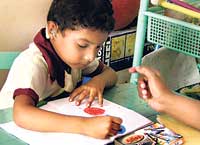
Giving ear to their needsLiving life is a learning experience; you have to learn how to walk, talk, read and write… But what if you had to actually learn how to listen? What if you have to learn how to do something that is taken for granted by those to whom it comes naturally? Five-year-old Malith, to all appearances, is a perfectly normal, friendly mischievous child But Malith has a hearing disorder. He deals with it cheerfully though, playing with his friends at Narada Savana Foundation. Established in 1999, by Nitha Weeratna, Narada Savana is a foundation that dedicates itself to helping the deaf and hearing impaired to develop their communication skills. Mrs. Weeratna, the Founder President of Narada Savana, began the institute because of her own personal experience. Her grandson Narada lost his hearing at the age of two. Mrs. Weeratna was in Canada at the time, and enrolled in a three month course in Auditory Verbal Therapy.
Sixteen years later, with the help of hearing aids and the knowledge gained in Canada, Narada lives a full life and will sit for his A/L’s in 2008. Inspired by his success, his grandmother founded an Early Intervention Centre to help other children in similar situations. Narada Savana now has eight students. A staff of four teachers dedicates time towards giving these children the necessary preparation to enter primary school at the right age. The foundation provides its students with appropriate hearing aids to enable them to follow the therapy successfully. An additional 20 students and eight adults have been given hearing aids. Six students of Narada Savana have been enrolled into good primary schools and are doing well. “If the impairment is detected early, rehabilitation is far easier and quicker,” says Mrs. Weeratna. “Very few people are totally deaf. In most cases, they have residual hearing, and this is something that can be made use of, given the right treatment.” The Early Intervention Pre-School has been in operation since May 2000. “There have been many requests for help from parents of hearing impaired children, but due to a lack of funds and facilities, we have not been able to help all of them,” says Mrs. Weeratna. The foundation hopes to start a bigger school in Yakkala, on which construction has already begun. Mrs. Weeratna says they would also like to start up a government assisted primary school in the future.
The Social Services Ministry and the Canadian International Hearing Services have helped the foundation in numerous ways, by way of funds and the provision of hearing aids. Knowledge of sign language is not fully effective, but speech therapy from an early age gives the child a better opportunity to be on par with his or her peers where studies are concerned. Hearing aids are essential but even the cheapest variety is priced at Rs. 10,000. Many of the students of Narada Savana come from poor families, and depend on the generosity of donors.
Helen Keller once said, “When you lose your eyesight you lose contact with things. When you lose your hearing, you lose contact with people.” The future of the hearing impaired lies in the hands of those who can afford to help make a difference. |
|| Front
Page | News | Editorial | Columns | Sports | Plus | Financial
Times | International | Mirror | TV
Times | Funday
Times || |
| |
Reproduction of articles permitted when used without any alterations to contents and the source. |
© Copyright
2007 | Wijeya
Newspapers Ltd.Colombo. Sri Lanka. All Rights Reserved. |
